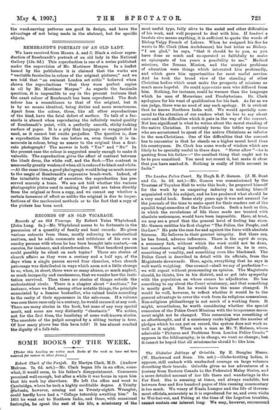SOME BOOKS OF TILE WEEK.
(Tinder this heading we notice meth Books of the week as have not bee marred for review in other forma] Robert Clark of the Punjab. By Martyn Clark, M.D. (Andrew Melrose. 'Ts. 6d. net.)—Mr. Clark began life in an office, some- what, it would seem, to his father's disappointment. Commerce promised well enough, but after a while it was borne in upon him that his work lay elsewhere. He left the office and went to Cambridge, where he took a highly creditable degree. A Trinity graduate, however, coming out as Twenty-eighth Wrangler, could hardly have had a "College tutorship awaiting him." In 1851 he went out to Northern India, and there, with occasional furloughs, he spent the rest of his life, a missionary of the most useful type, fully alive to the social and other difficulties of his work, and well prepared to deal with him. If laudari: a taudato vire means anything, it is sufficient to quote the words of Bishop Valpy French of Lahore. When he resigned his See he wrote to Mr. Clark (then Archdeacon) his last letter as Bishop. "I am glad," he says, "that it should be to you, as you have done so much and co-operated so faithfully to make an episcopate of ten years a possibility to me." Medical missions, the Zenana Mission, and the complex problems of education were things which interested him profoundly, and which gave him opportunities for most useful service. And he took the broad view of the standing- of other Christian bodies which must make the prospects of missions so much more hopeful. He could appreciate men who differed from him. Nothing, for instance, could be warmer than the language which he uses of Moravians and Presbyterians. Dr. Clark apologises for his want of qualification for his task. As far as we can judge, there was no need of any such apology. It is evident that he knows Northern India well. We would specially com- mend to the attention of our readers what he leas to say about caste and the difficulties which it puts in the way of the convert. Not less significant is what he writes about the moral standing of the native Christian. It certainly turns the tables upon those who are accustomed to speak of the native Christians as inferior to the non-Christians. One of the difficulties that the convert has to encounter is that he stands on a higher moral level than his countrymen. Dr. Clark has some words of wisdom which are likely to be specially useful in these days. "Never allow "—he is quoting from his father—" the smallest thing that ought not to be to pass unnoticed. You need not resent it, but make it clear that you have marked it. Nothing is really of little account in














































 Previous page
Previous page